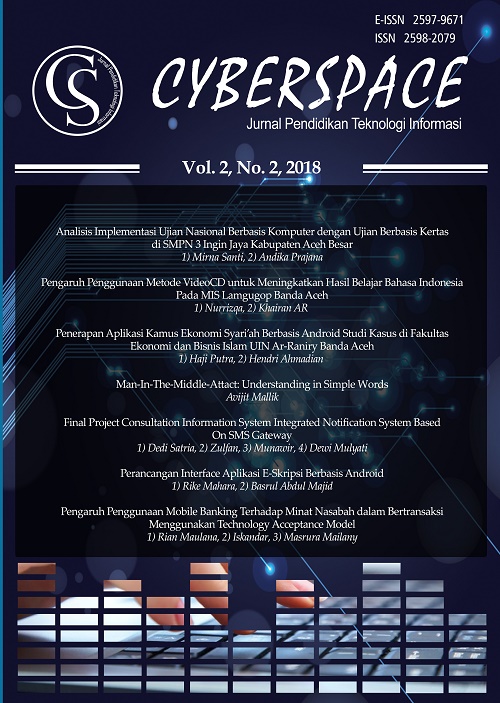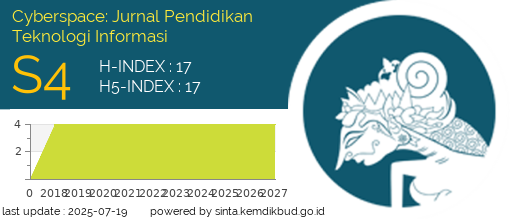PENERAPAN APLIKASI KAMUS EKONOMI SYARI’AH BERBASIS ANDROID STUDI KASUS DI FAKULTAS EKONOMI DAN BISNIS ISLAM UIN AR-RANIRY BANDA ACEH
DOI:
https://doi.org/10.22373/cj.v2i2.3999Keywords:
Dictionary, Economy Sharia, AndroidAbstract
Dictionary is what is needed to find a term with the right translation. Current technological developments make things very easy and inexpensive. The use of smartphone technology is now very suitable to replace the printed dictionary into a digital dictionary. This study aims to provide convenience for users who want to find the meaning of the term syari'ah especially for students of the Islamic Economics Study Program of the Faculty of Economics and Islamic Business, Ar-Raniry State Islamic University, Banda Aceh. This research uses Research and Development (R&D) method and is supported by the waterfall method for system development. Based on the question number 10 in this study, the conclusion of the respondents is only 2% which states neutral from all respondents, it can be said that almost all respondents said the application of Islamic Economics Dictionary makes it easier in the search for shari'a economic terms rather than dictionary shaped print.
References
Abdul Kadir, From Zero To A Pro: Pemrograman Aplikasi Android, Penerbit Andi Publisher, 2014
Ahmad Subagyo, Kamus Istilah Ekonomi Islam, Elex Media Komputindo, 2009
Arif Akbarul Huda, LiveCoding! 9 Aplikasi Android Buatan Sendiri, Penerbit Andi Publisher, 2014
Alfian Nurlifa, Analisis Pengaruh User Interface Terhadap Kemudahan Penggunaan Sistem Pendukung Keputusan Seorang Dokter. 2014
Bonowosari, L.Y, Analisis pada Fitur Auto Complete Suggestion dan Semantik pada Pencarian di Mesin Pencari Google, Universitas Gunadarma, 2014
Ed Burnette, Hello Android: Introduction Google Development Platform, The Pragmatic Programmers, LLC, 2010
Jay A. Kreibich, Using SQLite, O'Reilly Media, 2010
Kamus Besar Bahasa Indonesia (KBBI) Online, http://kbbi.web.id
Muhammad Hatta, Sutardi dan Bambang Pramono, Implementasi Kamus kata Serapan Bahasa Indonesia-Inggris dengan Fitur Auto Complete Text Menggunakan Algoritma Interpolation Search untuk Smartphone Berbasis Android, Universitas Haluleo, 2016
Muhammad Sholahuddin, Kamus Istilah Ekonomi, Keuangan & Bisnis Syariah Gramedia Pustaka Utama, 2011
M. Shalahuddin dan Rosa A.S, Rekayasa Perangkat Lunak Terstruktur dan Berorientasi Objek, Penerbit Informatika, Bandung, 2013
N. A. Hamidi, Skrisi S-I:”Rancang Bangun Sistem Informasi Manajemen Laundry Berbasis Android Dengan Metode Extreme Programming” Yogyakarta: UIN Sunan Kalijaga Yogyakarta, 2015
Nazrudin Safaat H, Rancang Bangun Aplikasi Multi Platform, Penerbit Informatika, Bandung, 2015
Nursalam, Konsep dan Penerapan Metodologi Penelitian Ilmu Keperawatan. Jakarta. Salemba Medika. 2008
Sri Haryati, ‘Research and Development (R&D) Sebagai Salah Satu Model Penelitian dalam Bidang Pendidikan’, 2012
Sugiono, Metode Penelitian Kualitatif Kuantitatif dan R & D, Bandung : 2016
Suryawinata Zuchridin & Hariyanto Sugeng, Translation Bahasan Teori & Penuntun Praktis Menerjemah, Karnisius,Yogyakarta 2003
Timothy C. Lethbridge dan Robert Laganière, Object-Oriented Software Engineering, McGraw Hill, 2001.
Zamrony P. Juhara, Panduan Lengkap Pemrograman Android, Penerbit Andi Publisher, 2016
Urutan Tingkatan Versi Nama Android, https://techijau.com/urutan-versi-nama-android, (diakses 14/08/17, 14.20 WIB)
Downloads
Published
Issue
Section
License
Authors who publish with Cyberspace Journal agree to the following terms:
- Authors retain copyright and grant the journal right of first publication with the work simultaneously licensed under a Creative Commons Attribution License that allows others to share the work with an acknowledgement of the work's authorship and initial publication in this journal.
- Authors are able to enter into separate, additional contractual arrangements for the non-exclusive distribution of the journal's published version of the work (e.g., post it to an institutional repository or publish it in a book), with an acknowledgement of its initial publication in this journal.
- Authors are permitted and encouraged to post their work online (e.g., in institutional repositories or on their website) prior to and during the submission process, as it can lead to productive exchanges, as well as earlier and greater citation of published work (See The Effect of Open Access).



















